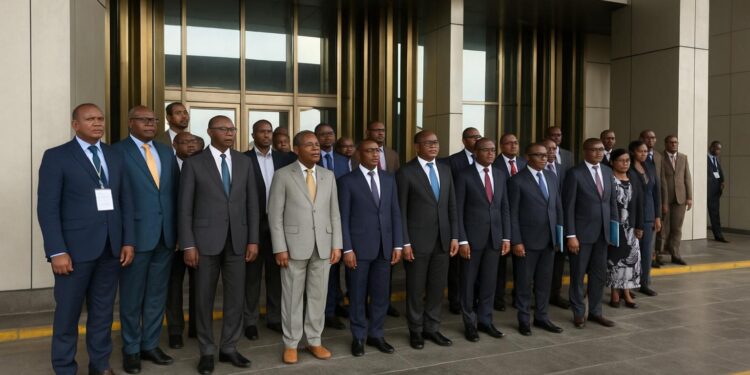Financial governance overhaul gains speed
Standing before senior civil servants in Brazzaville on 16 September, Finance, Budget and Public Portfolio Minister Christian Yoka declared that public finance management in the Republic of Congo is entering a “new era” aligned with recognised international good-practice standards.
His speech opened a four-day workshop tasked with presenting and validating a comprehensive compendium of general-purpose accounting norms for government entities, a document meant to become the cornerstone of Congo’s ongoing public-finance reform agenda.
He argued that adopting the new framework will curb revenue leakages stemming from asset misvaluation, tighten expenditure controls and enable a more rational budget orientation at a time when households and businesses face mounting resilience challenges.
For the authorities, transparency is not an academic pursuit but a strategic pillar, Yoka stressed, adding that credible bookkeeping can consolidate confidence among citizens, technical partners and constitutional institutions alike.
Financial statements to international benchmarks
Under the draft rules, central government accounts would present a balance sheet, an income statement, a cash-flow table and explanatory notes, mirroring the structure familiar to private-sector investors and multilateral lenders.
The reform also mandates certification by the Cour des Comptes et de Discipline Budgétaire, which will henceforth attest to the regularity, sincerity and fair view of the State’s general account.
By positioning the supreme audit institution at the centre of the process, Brazzaville signals its intention to convert legal texts into daily practice, tackling not only procedures but also behaviours and values, the minister noted.
Anti-corruption dividend
Yoka framed the forthcoming code as an “immense contribution” to Congo’s broader fight against corruption and so-called antivaleurs, because systematic recording of assets and liabilities can narrow the discretionary space that historically facilitated leakages.
Analysts point out that enhanced fiscal disclosure tends to lower sovereign risk premiums, a perspective of keen interest to investors tracking Brazzaville’s eurobond yields and potential future issuances.
Multilateral backing as reform catalyst
The accounting manual under review was prepared with technical and financial assistance from the World Bank and the International Monetary Fund, primarily through the Accelerated Governance and Institutional Reforms Programme (PAGIR).
Both Bretton Woods institutions have underscored the link between transparent public ledgers and debt sustainability, a crucial matter for Congo as it continues to implement its Extended Credit Facility arrangement.
Observers familiar with the dossier say that demonstrating tangible progress on accounting standards could unlock additional budget-support tranches and concessional project financing over the next fiscal years.
What changes on the ground?
Once promulgated, the compendium will impose unified chart-of-account principles on line ministries, state-owned enterprises and decentralised entities, replacing a patchwork of legacy systems that often impeded the consolidation of reliable macro-fiscal statistics.
Training modules, digital templates and follow-up audits are expected to accompany the rollout, ensuring that the reform is not confined to headquarters in Brazzaville but reaches accounting units nationwide, including in resource-producing departments.
Although no official timeline has been released, participants said the workshop’s validation could pave the way for ministerial decrees before the next budget cycle, giving departments several months to adjust procedures.
Implications for private sector and diaspora
For domestic SMEs seeking public contracts and for Congolese diaspora professionals considering a return, the promise of standardized, audited state accounts offers clearer benchmarks, potentially easing due-diligence processes and improving perceptions of country risk.
International oil, mining and telecom operators, whose concession agreements often include profit-sharing and tax-stability clauses, could also benefit from more transparent reconciliation between extractive revenues and the treasury’s single account.
Maintaining reform momentum
Experts caution that legal adoption is only the first mile; sustained political backing, adequate IT infrastructure and continuous capacity-building will determine whether Congo’s new accounting framework produces the anticipated fiscal dividends.
Yet the commitment voiced by Minister Yoka, coupled with the involvement of the World Bank, IMF and the Cour des Comptes, suggests a solid coalition behind the modernisation drive, one that aligns national priorities with the expectations of regional markets and international partners.
Digitalization and regional convergence
Digital accounting platforms are expected to complement the normative overhaul, replacing manual ledgers with real-time dashboards that can feed the Ministry’s forthcoming fiscal-risk unit and support early-warning mechanisms.
Officials intimate that the reform is designed to dovetail with the CEMAC regional directive on public finance statistics, potentially streamlining comparisons among neighbouring economies and bolstering Brazzaville’s voice in BEAC policy discussions.
Looking ahead, the Ministry plans periodic public-access reports summarising execution rates and arrears, a step civil-society groups have long recommended to enhance budget literacy and improve the feedback loop between taxpayers and policymakers.
Market watchers will monitor whether the strengthened reporting architecture translates into quicker disbursement for infrastructure projects in energy, roads and digital connectivity, the backbone sectors of Congo’s 2022–2026 National Development Plan.
If successfully implemented, the standardised ledger may serve as a template for other CEMAC members, reinforcing Congo’s standing as an early adopter of governance innovations within the sub-region.












































